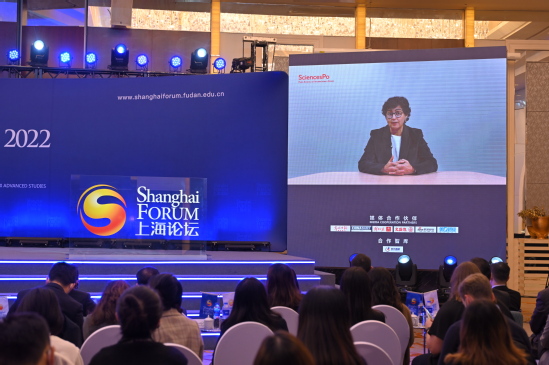Hello, welcome to visit Shanghai Forum

Dean, Paris School of International Affairs, Sciences Po;
Former Minister of Foreign Affairs, European Union and Cooperation, Spain;
Former Chief of Staff to the Director-General of the WTO
Many thanks to the Shanghai Forum for your kind invitation to join you today. You have invited me to speak about Asia’s response to the plural global challenges. I will try to address this question as an old friend of China, as a committed multilateralist and now as the Dean of the Paris School of International Affairs at Sciences Po: with candidness and lucidity.
These are troubled times. We are witnessing an accumulation and acceleration of multiples crisis that are proving extremely hard to manage. We are seeing multiple fractures appearing.
In 2020 a pandemic spread across the world causing economic and social havoc. Covid led to millions dying, brought economies to a standstill and created a major setback in our objective of reaching the sustainable development goals by 2030. Close to 100 million people have now gone back into abject poverty. And although scientists collaborated to discover a vaccine against covid in record time, it is fair to say that access to vaccines has been very unequal around the world, with only 30% of Africans having received at least one dose.
As the world was recovering from the pandemic war in Ukraine has now created major disruptions in food, fuel and fertiliser markets affecting millions of poor people around the world. We must ensure that the very principles on which the international system is based: respect for the sovereignty and territorial integrity of another state be respected by all.
And as if this was not enough, we are seeing the return of geopolitics in full force with a heightened sino-American rivalry centred around technology.
Climate change continues to advance and we are on course to miss the commitment we have taken to keep temperature increases under control. We know the results: droughts, floods, wild fires, ice melting. Islands disappearing, huge economic costs and millions of lives affected.
And the global economy that has powered the emergence of solid middle classes in Asia risks losing steam if geopolitical considerations trump economic laws. We face the risk of a fragmented world economy that will lead to greater inflationary pressures and will impact innovation, competitiveness and ultimately growth.
The return to a bipolar world will not be good for Asia. Asia is home to close to 60% of the world population, 40% of global GDP, 75% of semiconductor manufacturing, around 40% of international trade. In a nutshell, Asia is a big stakeholder and engine of the global economy. Asia has a strong interest in a more open, transparent and predictable global economy. At the same time Asia must be ready to contribute to it.
And with China being a very important part of Asia, China has a specific responsibility to contribute to a more stable and predictable economy by continuing with its own reforms and opening. Let me offer a few suggestions as to what Asia’s response could be following ancient Chinese wisdom which says that “succesful governance relies on solid action”.
-First, appease, not escalate.
As India Prime Minister recently said, this is not the time for wars. Asia should avoid feeding tensions that could escalate into conflicts. This is a message that is valid for other parts of the world too. Appeasement is not weakness, it is wisdom.
-Second, continue to open and reform, not go autarchic.
Asia and China in particular, should continue the process of reform and opening. Reform is essential to avoid the middle-income trap. Openness is essential to foster innovation and competitiveness. It is also essential to generate the growth that helps leave no citizen behind.
-Third, be a force in support of multilateralism, avoid the trap of purely nationalistic approaches.
In the midst of existing tensions, we need to maintain spaces for global cooperation in international trade, in ensuring global financial stability, in nuclear non-proliferation, in the fight against pandemics, Asia can be a firm defender of multilateralism
- Fourth, priority to fight climate change.
Climate change is our common existential threat. Asia has experienced first hand its terrible impact in the last months. China has seen record breaking heatwaves, severe droughts and deadly rainfall in recent months.
We will not win that battle if we do not work together. We need more ambition and we need to move faster. We need to act now to guarantee future generations.
At a recent event I said that what is good for China needs to be good for the rest of the world. And that what is good for the rest of the world needs to be good for China. This, I believe, is the spirit with which Asia should approach the coming period: enlightened self-interest.
Thank you very much for your attention and best wishes for the forum.